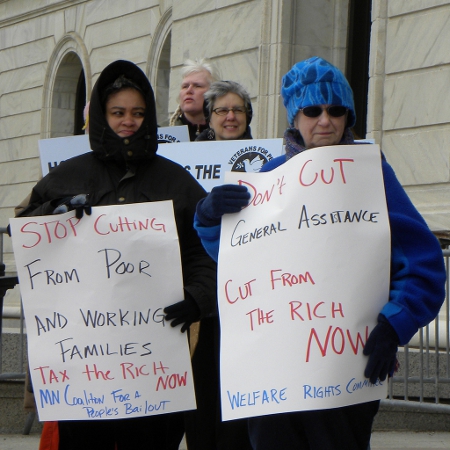 The argument that cutting social spending is an essential part of necessary fiscal adjustments is pervasive. That slashing welfare does not harm economic growth while tax hikes do is treated as received wisdom by many academics and policymakers. Georg Wenzelburger deconstructs the argument in favour of welfare cuts, writing that we need a much more nuanced understanding of the underlying mechanisms which distinguish successful from unsuccessful adjustments.
The argument that cutting social spending is an essential part of necessary fiscal adjustments is pervasive. That slashing welfare does not harm economic growth while tax hikes do is treated as received wisdom by many academics and policymakers. Georg Wenzelburger deconstructs the argument in favour of welfare cuts, writing that we need a much more nuanced understanding of the underlying mechanisms which distinguish successful from unsuccessful adjustments.
“Any fiscal adjustment hoping to be successful cannot avoid dealing with cuts in the welfare state and in government wages and employment”. This statement by economists Alberto Alesina and Roberto Perotti (see p.227 here) is just one example of the advice commonly given to policy-makers that budget consolidations are only successful (i.e. lead to economic growth) if welfare benefits are slashed. Over and over, think tanks and policy advisors have put forward this relationship between cutting welfare and successful fiscal adjustments in their policy recommendations. And indeed, a vast body of econometric research, including the work of Alesina and Perotti, has shown that fiscal adjustments which mainly rely on spending cuts do not harm economic growth (the criterion for success), whereas budget consolidations by means of tax hikes have negative consequences (for example, see here and here).
However, for political scientists in general and scholars of social policies in particular, the simplicity of this argument is puzzling in two respects. First, in welfare state research, much has been written about the “dependent variable problem” which means that reductions of social spending do not necessarily equal cuts in benefits (see here, here and here). If unemployment increases, for instance, social spending will increase automatically as more people are entitled to unemployment benefits. Hence, even a small cut in benefits may well be offset by this development. Consequently, recent studies on welfare state retrenchment tend to use replacement rates or indices of welfare state generosity instead of social spending (see here and here). In contrast, the empirical foundation of the “cutting welfare” advice is built on analyses of social spending cuts.
Second, scholars of welfare state retrenchment have pointed out recently that there is no such thing as the welfare state. Instead, the term covers many different programs which follow different dynamics and different logics. Recent analyses have for instance shown that governments cut unemployment benefits much more easily (and more frequently) than pensions (see here and here). From this perspective, it would therefore be important to disaggregate the welfare state into its components and see which program matters most for successful adjustments instead of looking at the overall aggregate measure of social spending. Summing up these two points, the policy advice that adjusting public finances by cutting welfare is the best way to proceed seems far too simplistic.
Empirical results corroborate this claim. If one uses the two said insights from welfare state research and refines the analysis of fiscal adjustments accordingly, the relationship between “cutting welfare” and “successful adjustment” looks very different: First, the statistical relationship between welfare cuts and the success of fiscal adjustments completely disappears when generosity measures are used (measured inter alia by replacement rates or eligibility criteria) instead of social expenditures. Second, whereas reductions of unemployment insurance benefits have no effect on the success of fiscal adjustments, cuts in pension generosity have an effect (see my work for more on this).

How can we make sense of these results? The first point, namely that there is no statistical relationship for generosity measures but such an association exists for spending, underscores the significance of the “dependent variable problem”. Rising demand for social benefits is a non-negligible factor which impacts on spending independently of governmental decisions on benefit levels or eligibility criteria. Hence, policy recommendations about benefit levels based on empirical results for social sending are highly problematic. In addition, the second finding on the difference between unemployment and pension cuts also contributes to understanding the non-relationship between overall generosity reductions and successful adjustments: As overall generosity covers many different components of the welfare state, looking for correlations at this level of abstraction does not uncover the relationships further below. As the retrenchment of unemployment benefits and pension benefits follow different logics, throwing both programs together therefore blurs the underlying causality. In conclusion, the empirical results therefore suggest a more nuanced interpretation, namely that reductions of pension benefits are an important ingredient for successful fiscal adjustments whereas cuts in unemployment benefits are not.
This result makes perfect sense with regard to the major theoretical argument which provides the causal link between welfare cuts and successful adjustments. Economists argue that the main reason why welfare cuts are crucial to successful adjustments has to do with credibility. Governments that attack the electorally most delicate parts of the budget – namely welfare entitlements which are popular with the majority of voters – show that they are really serious about balancing the budget. This idea that cutting welfare increases the credibility of governments is relevant in two respects: First, international financial markets reward credible consolidation efforts by lowering the risk premium on the interest rates for government bonds. This, in turn, encourages investment and leads to economic growth.
Secondly, citizens and entrepreneurs acknowledge the determination of the government to reduce deficits. They are more confident about the future, consume and invest more which, again, leads to economic growth. The finding that reductions of pension benefits are an important ingredient to successful fiscal adjustments whereas cuts in unemployment benefits are not impotant nicely fits into this theoretical framework. Pension systems can be considered to be the most difficult part of the welfare state to retrench, due to the entrenched interests associated with them and the broad electoral support. Therefore cutting pensions is the hard case for a government’s determination to balance the budget. This explains theoretically why the link between cuts in pension generosity and successful adjustments is clearly present in the data, whereas reductions of unemployment benefits do not lead to said effects.
These results have important consequences for policymakers and policy advisors. They show that we need a much more nuanced understanding of the underlying mechanisms which distinguish successful from unsuccessful adjustments. In the actual context of the debt crisis which is characterized inter alia by a special monetary policy context, the need for nuanced arguments is even more important. Simple advice such as “cutting welfare leads to successful adjustments” therefore have to be taken with a grain of salt.
Note: This article gives the views of the author, and not the position of the British Politics and Policy blog, nor of the London School of Economics. Please read our comments policy before posting.
About the Author
Dr Georg Wenzelburger is assistant professor at the Chair of Comparative Politics at Freiburg University, Germany. He received his PhD from Ruprecht-Karls-University, Heidelberg, Germany. His articles were published inter alia in the British Journal of Political Science, West European Politics, the Journal of Public Policy, the Journal of European Public Policy and the Journal of European Social Policy. His research interests include the politics of welfare state reform, fiscal policy and the politics of law and order.








2 Comments